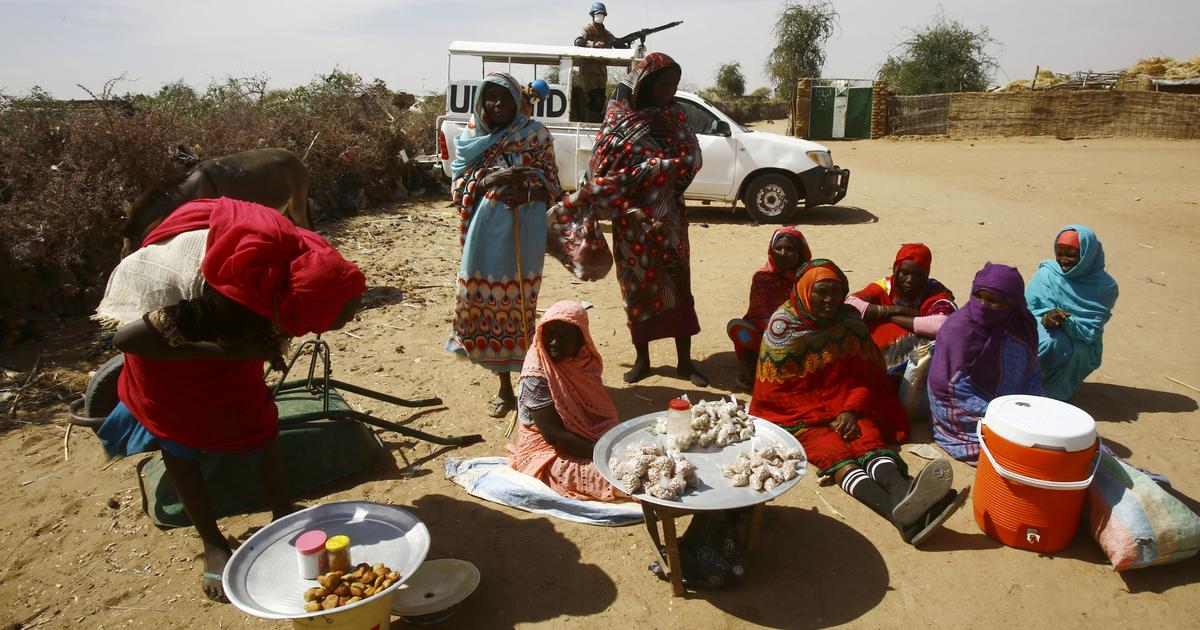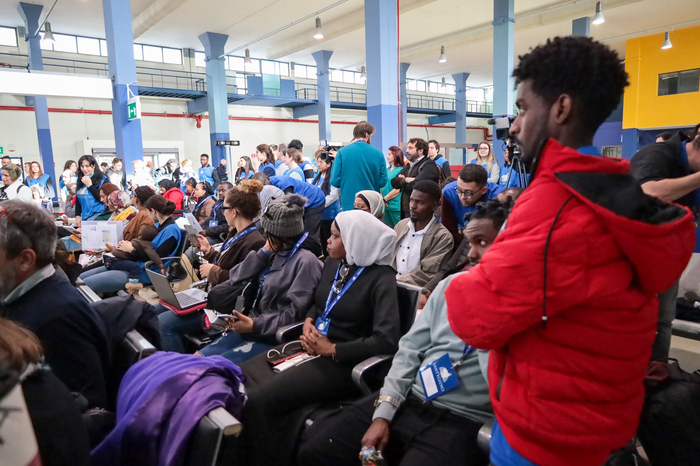UN expert warns of consequences of Ukraine war: "Famine worse than in Somalia or Sudan"
Created: 04/21/2022, 05:10
By: Thomas Schmidtutz
Ayan Muhammed and her severely malnourished son Fahir in Gode Hospital in Ethiopia: The Horn of Africa is threatened by the worst drought in forty years.
In addition, the grain supply situation continues to worsen due to the Ukraine war.
© Zerihun Sewunet/dpa
Ukraine and Russia are the world's largest wheat exporters.
But because of the war, huge crop failures are now threatening - with dire consequences for the poorest countries in Africa.
Munich -
The Food and Agriculture Organization (FAO) has warned of the possible consequences of the Ukraine war*.
In view of the massive crop failures in wheat in Ukraine and the Russian ban on grain and fertilizer exports, there was a risk of famine "affecting large regions of the world and several countries worldwide," warned Mario, head of the Global Information and Early Warning System for Food and Agriculture (GIEWS). Interview with Zappacosta.
Merkur.de*
spoke to the economist about the tense supply situation, the risk of social unrest and the drastic changes in aid funds.
Mario, Ukraine and Russia account for 30 percent of global wheat exports. Many African countries get most of their wheat needs from these two countries. But because of the war, farmers in Ukraine cannot sow. At the same time, Russia has imposed an export ban on wheat and other types of grain and fertilizer - and the FAO index for staple foods is at record levels
.
How concerned are you?
In fact, we view the development with great concern.
But that's not because of the war alone.
Most of the problems with the supply of staple foods in many poorer countries in Africa, for example, existed before the war broke out, just think of the prices on the world market: food prices were already at record levels in 2020 and 2021.
This has continued since the beginning of the year and has even accelerated since the outbreak of war.
In March alone, the FAO grain sub-index rose 24.9 percent from February, while the edible oil sub-index rose 23.2 percent over the month.
We have not seen a similarly drastic increase across the board since the FAO Food Index was introduced in 1990.
Was the supply situation, at least for wheat, already tense due to the weaker than expected US harvest?
Yes.
Now it's getting even tighter.
In the current year, around ten to twelve million tons of wheat will be missing on the world market because of the war in Ukraine.
We must therefore be prepared for further increases in prices.
FAO expert: Yemen and Lebanon face dire famines
Which countries will feel the consequences of the delivery failure from Ukraine and Russia in particular?
This will primarily affect the countries in North Africa and the Middle East, but also the countries on the Horn of Africa, i.e. Somalia, Ethiopia, Sudan and Eritrea.
In the past, these countries have already had to contend with enormous food supply problems due to extreme drought, local conflicts and most recently the Covid pandemic.
With the sharp price increases on the world market and the consequences of the Ukraine conflict, the situation is now becoming even more acute.
Who is likely to be hit the hardest?
We see the greatest dangers in Yemen and Lebanon.
Why?
In both countries, the diet is very heavily based on wheat.
In addition, both states had to contend with very great difficulties even before the outbreak of war.
A terrible civil war has been raging in Yemen for years, and malnutrition is widespread there.
With supply shortages and high wheat prices, rampant malnutrition could now lead to severe famine.
Lebanon is in a severe economic crisis.
The national currency has plummeted against other major currencies such as the US dollar.
This has already made grain and food imports much more expensive.
In addition, the central wheat storage facility in the port of Beirut was completely destroyed in a huge explosion in August 2020*.
Lebanon can currently store wheat for just two months.
That is why the country now has to continuously buy more wheat on the world market - and at high and rising prices.
How many people could be particularly affected by the wheat supply shortages?
At the FAO, we assume that the Ukraine crisis alone is threatening another eight to 13 million people with malnutrition.
Mario Zappacosta: The economist is Head of the Global Information and Early Warning System for Food and Agriculture at the Food and Agriculture Organization (FAO) in Rome.
© (private)
FAO expert: Rising fertilizer prices will further aggravate the supply situation in poorer countries
It's not just food prices that are rising worldwide. Fertilizer is also getting more and more expensive. How dangerous is this development for the poorest countries in the world?
That's a huge problem.
The production of fertilizers is very energy-intensive and the prices for oil and gas have also risen sharply recently.
As a result, the already historically high prices for fertilizer should continue to rise.
As a result, many farmers in poorer countries will hardly be able to afford fertilizer and will plant less or just as much as before, but with lower yields.
This applies not only to wheat cultivation, but to all types of agricultural crops, whether vegetables, feed products or rice.
So the situation is worrying?
We have had several famines in Somalia, Sudan and other countries in recent years.
But these were crises on a national level.
Our concern is that, because of the fallout from the Ukraine war, we may soon face a crisis of much wider scope, affecting large regions of the world and several countries around the world.
Such a scenario is becoming more likely every day.
Severe political unrest has just broken out in Sri Lanka due to shortages in the supply of food to the population. Rising prices of basic commodities have also played a central role in other unrest such as the Arab Spring. Is such a scenario now threatening again?
We know from history that when the prices of staple foods rise, it often leads to riots and riots.
Of course, governments can subsidize basic necessities with state aid payments or support the situation in other ways.
But that depends heavily on the respective financial possibilities.
If a country is poor and prices on the world market are rising sharply, the situation becomes more and more complicated.
There comes a point when governments have to decide: Do we invest in infrastructure, health or education - or in food?
FAO expert: Aid funds are currently flowing primarily to Ukraine
What does development mean for humanitarian aid?
A significant and growing amount of public and private aid is currently flowing to Ukraine because of the war.
However, the absolute amount of aid money is not increasing, the money is just going elsewhere.
Take Somalia as an example: the country has applied for billions in aid, but has only received a fraction of it so far.
So the world is forgetting about the poorest countries because of the current crisis in Ukraine?
This is not a new development.
We also experienced something similar during the Syrian war.
For example, if more money goes to Ukraine, less arrives in South Sudan – without the situation in South Sudan having improved at all in recent years.
What does that mean for the local people: will more people turn their backs on their homeland and seek refuge in other countries, including Europe?
Wars and famines have regularly led to refugee movements in the past.
A possible deterioration in the food supply and growing social tensions are also likely to lead to increased migration.
What could Germany and the EU do to help?
Rich countries are already helping in many different ways.
The EU, but also individual countries such as Italy or Germany, have launched numerous aid programs or support NGOs, other humanitarian aid organizations and the UN.
But it is also true that 20 years ago significantly more aid was available than today.
During the corona pandemic*, this development was particularly evident again.
All rich countries were in recession and, because of the lockdown, focused primarily on supporting their own economies.
Hardly anyone thought of the farmers in Somalia.
But again: What would have to happen in concrete terms for the situation in the poorest countries to improve at least a little?
An important approach would certainly be better and more careful handling of food.
In richer countries, we often buy more than we can eat and then a lot of food goes bad in the fridge.
In poorer countries, a lot of production is lost on the way from field to market, if only because the transport takes too long and the products spoil along the way.
25 to 30 percent of the harvest is quickly missing.
The second key point would be investments in infrastructure.
In many poorer countries, for example, the construction of roads would already help so that farmers could sell their products in markets that are further away.
And thirdly - and at least as important - would be additional investments in education and know-how, for example in new technologies in cultivation.
About:
Mario Zappacosta is an economist and head of the Global Information and Early Warning System for Food and Agriculture (GIEWS) at the Food and Agriculture Organization (FAO) of the UN in Rome.
The GIEWS monitors food supply and demand worldwide.
Zappacosta has led numerous FAO missions to various countries affected by food crises, including Syria, Sudan, Yemen and North Korea.
*Merkur.de is part of IPPEN.MEDIA


/cloudfront-eu-central-1.images.arcpublishing.com/prisa/E3I6SSZZQ6W6BXIAXV5VG36JCY.jpg)


/cloudfront-eu-central-1.images.arcpublishing.com/prisa/Q3R3DI62AJHR7AGTRNQPF2AHCI.jpg)






/cloudfront-eu-central-1.images.arcpublishing.com/prisa/KMEYMJKESBAZBE4MRBAM4TGHIQ.jpg)


